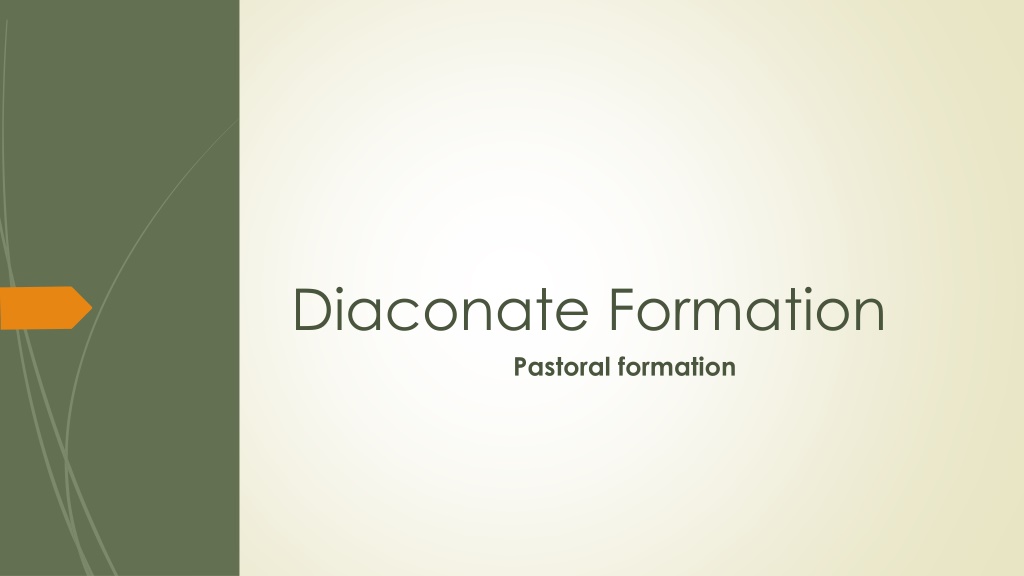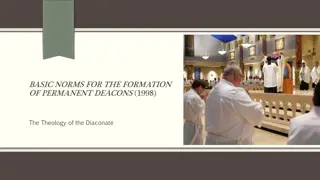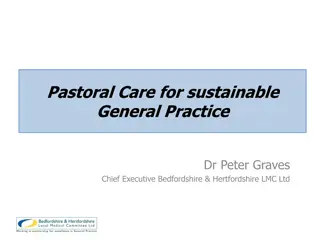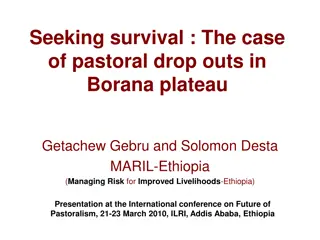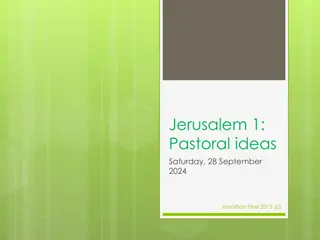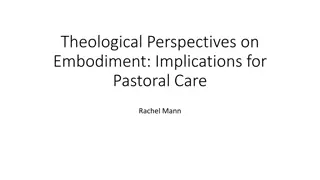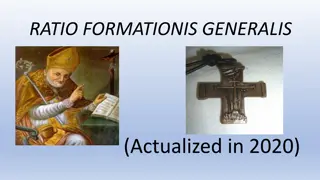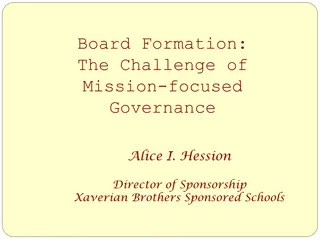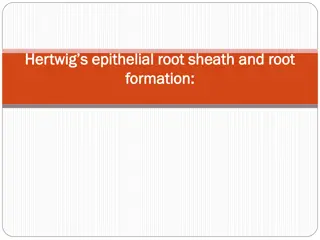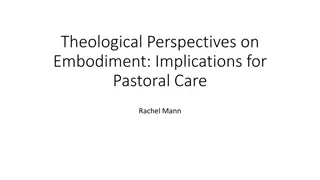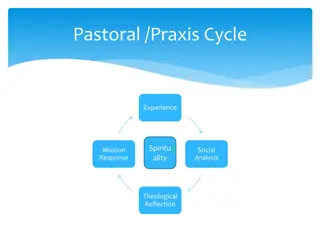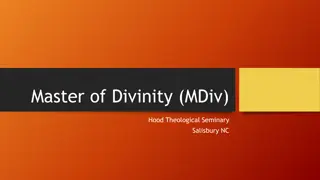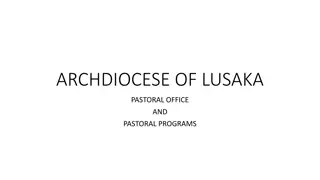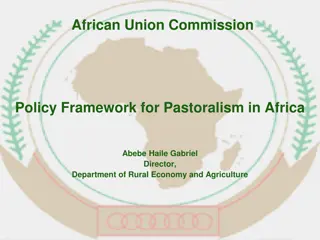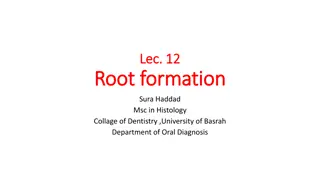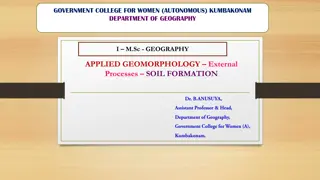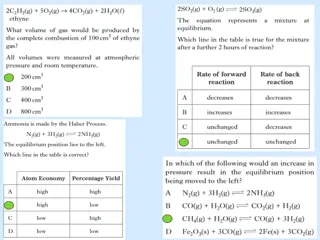Understanding the Integral Role of Pastoral Formation in Diaconate Training
The formation of permanent deacons involves a comprehensive approach that integrates the human, spiritual, and intellectual dimensions with a strong emphasis on pastoral practice. Deacons are seen as living icons of Jesus the servant, especially in their ministry of charity towards the poor. Pastoral assignments play a crucial role in this formation, offering diverse opportunities for participants to engage actively in various pastoral situations and develop a deep understanding of discipleship in the service of others.
Download Presentation

Please find below an Image/Link to download the presentation.
The content on the website is provided AS IS for your information and personal use only. It may not be sold, licensed, or shared on other websites without obtaining consent from the author. Download presentation by click this link. If you encounter any issues during the download, it is possible that the publisher has removed the file from their server.
E N D
Presentation Transcript
Diaconate Formation Pastoral formation
The Basic Norms for the Formation of Permanent Deacons: http://www.vatican.va/roman_curia/congregatio ns/ccatheduc/documents/rc_con_ccatheduc_do c_31031998_directorium-diaconi_en.html The National Directory for the Formation, Ministry, and Life of Permanent Deacons: https://usccb.cld.bz/National-Directory Resources
Deacon: a living icon of Jesus the servant The ministry of charity is most characteristic of the deacon. In fact, with sacred ordination, [the deacon] is constituted a living icon of Christ the Servant within the Church. (National Directory, 2ndEdition, 157)
The Spirit of the Gospel From its beginnings, the ministry of the deacon encompassed stewardship of the Church s material goods, making evident the claim of the poor on the resources of the community. Deacons helped to ensure that the allocation of those resources made provision for meaningful assistance to those who suffered from poverty, hunger, homelessness, and disease. Today, the restored diaconate maintains this traditional stewardship through its commitment to the poor. (National Directory, 157)
Integrating role of pastoral formation An integral formation must relate the human, spiritual, and intellectual dimensions to pastoral practice. The whole formation imparted to [the participants] . . . aims at preparing them to enter into communion with the charity of Christ. . . . Hence their formation in its different aspects must have a fundamentally pastoral character. within that context, the pastoral dimension in initial formation is not merely an apprenticeship to familiarize the participant in diaconal formation with some pastoral techniques. Its aim, however, is to initiate the participant into the sensitivity of what it means to be a disciple of Jesus, who came to serve and not to be served (National Directory, 135)
Integrating role of pastoral formation (Cont ) Pastoral assignments embody this orientation, promoting learning through active engagement in a pastoral situation. Pastoral assignments foster a general integration in the formational process, forging a close link between the human, spiritual, and intellectual dimensions in formation. Evangelization; Catholic schools; catechetics; religious education; youth ministry; social justice outreach opportunities; rural ministry; ecumenism; prison ministry; the care of the sick, elderly, and dying; and service opportunities in varied cultural settings all these indicate the breadth of experiences to which the participant may be exposed in the course of his pastoral formation. (National Directory, 135)
objectives of the pastoral dimension (National directory, 136) The pastoral dimension in diaconal formation should strengthen and enhance the exercise of the prophetic, priestly, and servant- leadership functions deriving from his baptismal consecration already lived and exercised by the participant in diaconal formation: Proclaim the Christian message and teach it Lead others in communal celebrations of liturgical prayer Witness the Church in a Christian serviced marked by charity and justice Strong missionary sensitivity
Qualities to be develop by the pastoral dimension (National directory, 136) The demonstration of pastoral skills is a crucial element in the assessment of fitness for ordination: A spirit of pastoral responsibility and servant-leadership Generosity and perseverance Ability to collaborate Creativity Respect for ecclesial communion Filial obedience to the diocesan bishop Through his participation in pastoral assignments, the participant should have a genuine confidence in his abilities and a realistic sense of his limitations.
The Churchs ministry of Charity: the deacon as witness and guide The deacon s ministry, as St. John Paul II says, is the Church s service sacramentalized. Therefore, the deacon s service in the Church s ministry of Word and Liturgy would be severely deficient if his exemplary witness and assistance in the Church s ministry of charity did not accompany it. Thus St. John Paul II affirms both: This is at the very heart of the diaconate to which you have been called: to be a servant of the mysteries of Christ and, at one and the same time, to be a servant of your brothers and sisters. That these two dimensions are inseparably joined together in one reality shows the important nature of the ministry which is yours by ordination . (National Directory, 38) As a [participant] in the one ecclesiastical ministry, [the deacon] is a specific sacramental sign, in the Church, of Christ the Servant. His role is to express the needs and desires of the Christian communities and to be a driving force for service, or diakonia, which is an essential part of the mission of the Church. (National directory, 39) The service of charity is twofold: it is ministering to both the spiritual and physical needs of others. This charity is both love of God and love of neighbor. . . (National Directory, 39)
Pastoral Internships Supervised pastoral formation placements should be designed and adapted to the needs of the individual participant, helping him to gradually and appropriately experience in his pastoral placement what he has learned in his study. (National Directory, 138) During the formation process the men in formation will have a dual pastoral assignment in accord with their stage of formation (Aspirancy/Candidacy): Parish Pastoral Internship (Word and Liturgy ministry) Ministry of Charity Assignment. The purpose of the dual assignment is: the participant should acquire an appropriate multicultural awareness, exposure, and sensitivity, suitable to the needs of the diocese, including the possibility of learning a second language and studying its cultural context.
Pastoral Internships by Formation Stage Aspirant Stage -Year 1 First Semester The student will remain at his home parish and continues to be involved in the liturgical ministries they were involved before admission to aspirancy such as Lector, Acolyte, EMHC, Altar Server. The student will not have a charity assignment during his first semester of formation. Second Semester The student should start to serve in areas of ministry where he has not previously served. The student will be assigned a ministry of charity to serve the poor and marginalized. typical assignments are shelters and Catholic Charities. Aspirant Stage -Year 2 The student will receive a new parish assignment and should focus on hospitality and awareness of the parish, pastoral care, outreach, and teaching the faith as well as liturgical ministries. The student will continue ministering to the poor and marginalized to provide him with opportunities for growth in a spirit of service to God s people through service in shelters, Catholic Charities, etc.
Pastoral Internships by Formation stage Candidacy year 1-3 Theological Reflection Parish: Teaching the Faith: Sacramental Prep Parish: Teaching the Faith: Sacramental Prep Charity: Hospital Chaplaincy Supervised Ministry Proclamation of the Word Charity: Hospital Chaplaincy Supervised Ministry Year 1 Sacraments of Initiation Homiletics 1 Parish: Teaching the Faith: Marriage Prep Charity: Hospital Chaplaincy Supervised Ministry Ministry of Acolyte/Sacristy Homiletics 2 Parish: Teaching the Faith: Marriage Prep Charity: Hospital Chaplaincy Supervised Ministry Year 2 Homiletics 3: Liturgical Preaching Presidential Leadership of the Sacraments 1 Parish: Sacraments of Initiation (RCIA) Charity: Hospice/ Prison Chaplaincy Supervised Ministry Homiletics 4: Special Occasions Presidential Leadership of the Sacraments 2 Parish: Sacraments of Initiation (RCIA) Charity: Hospice/Prison Chaplaincy Supervised Ministry Year 3
Pastoral internship tasks examples: Holy Communion to the sick and homebound Holy Communion to those parishioners in nursing homes and hospitals Assisting in liturgical ministry: Lector, Acolyte, Sacristan, EMHC Faith Formation (teaching the faith) to Adults, Children, Youth, RCIA Assisting in sacramental preparation, in particular baptism and marriage Shadow priest/deacon in celebration of funeral rites, baptism, holy matrimony Ministry of Charity: Prison ministry, Hospice, Catholic Charities, Nursing Homes, Detention Center and Shelters, Hospital Chaplaincy
Who supervises the students in their placements? Parish Assignment: Pastor Pastor may appoint a Deacon or someone other than a deacon Charity Assignment (Diocesan Ministry): the volunteer coordinator, the chaplain, etc. The Assistant Director of Pastoral Field Education works in collaboration with all site supervisors
Role of the Director of pastoral Formation Assists the director of formation in the apostolic formation of aspirants and candidates Introduces the students into suitable pastoral experiences, equipping them with pastoral knowledge, skills, and discernment for diaconal ministry Arranges for the pastoral placements of aspirants and candidates Coordinates an orientation and training of those who assist in the pastoral placements Providesa written assessment [evaluation] of the student s pastoral experience
